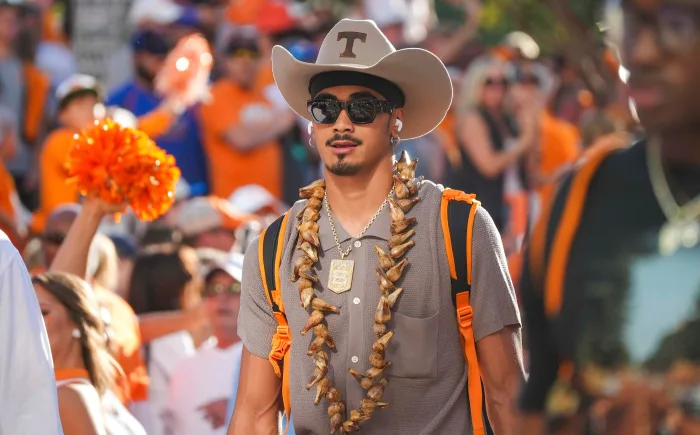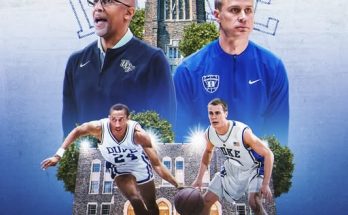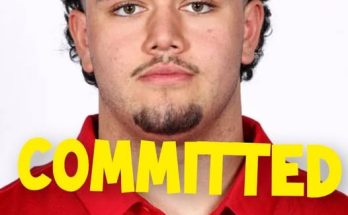Nico Iamaleava, once the heralded quarterback recruit who brought a wave of excitement to Tennessee Volunteers football, has recently shared a new, more reflective message about his time at Tennessee. After a rollercoaster tenure that involved highs on the field, challenges off the field, and a surprising transfer, his latest words give fans and observers a deeper look at how he views that chapter of his career. This article dives into Iamaleava’s journey at Tennessee, the controversies that defined it, and what his new message reveals about his mindset, growth, and future.
The Rise of a Five-Star Recruit
Nico Iamaleava entered the college football world as one of the brightest quarterback prospects in the 2023 recruiting class. Hailing from Long Beach, California, he was rated a five-star recruit and touted for his impressive arm strength, mobility, and poise in the pocket. His commitment to the University of Tennessee was seen as a massive win for the Volunteers — a program eager to return to national prominence.
From the moment he arrived, expectations were sky-high. Tennessee fans and analysts alike envisioned Iamaleava as a transformational player who could lead the team back to College Football Playoff contention and beyond. His freshman season gave a glimpse of that potential. In Tennessee’s season opener, he threw for over 300 yards and multiple touchdowns, impressing many with his ability to extend plays and make accurate throws under pressure.
Former Ohio State head coach Urban Meyer, a respected voice in football circles, called Iamaleava a “monster” with NFL potential after witnessing his early performances. The hype surrounding the young quarterback was intense, and many saw him as a future NFL draft pick.
The Off-Field Challenges and NIL Controversies
However, behind the promising on-field moments, Iamaleava’s time at Tennessee quickly became complicated. Like many top athletes in the modern NCAA landscape, he found himself navigating the new and often turbulent waters of Name, Image, and Likeness (NIL) deals — a system that allows college athletes to profit from endorsements and sponsorships.
Initially, Iamaleava secured a lucrative NIL contract estimated at $2.4 million annually. This deal, among the largest in college football, highlighted his marketability and star power. Yet, as the NIL landscape shifted and the quarterback market for top players became increasingly competitive, Iamaleava sought to renegotiate his deal to nearly double the amount — aiming for $4 million annually.
This pursuit of higher NIL compensation led to friction between Iamaleava and Tennessee’s coaching and administrative staff. The University, wary of escalating financial commitments, hesitated to meet his demands. What followed was a public and somewhat contentious standoff, culminating in Iamaleava’s absence from team practices and meetings. The Volunteers, led by head coach Josh Heupel, made the difficult decision to part ways with their star quarterback.
This departure sparked widespread debate across college football communities. Critics argued Iamaleava prioritized money over team loyalty, painting him as a player who put personal gain above program stability. Supporters countered that the evolving NIL era empowered players to advocate for their worth and that Tennessee’s reluctance to meet reasonable demands was shortsighted.
Iamaleava’s Transfer and Fresh Start at UCLA
After his departure from Tennessee, Iamaleava entered the NCAA transfer portal, a now common pathway for athletes seeking new opportunities. His transfer to UCLA was seen as a logical fit — returning closer to home in California and joining a program with its own upward trajectory.
In his announcement, Iamaleava expressed gratitude for his time at Tennessee despite the challenges. He acknowledged the rollercoaster of emotions, from initial excitement to frustration, but emphasized the importance of growth through adversity. Faith played a significant role in his outlook; Iamaleava often referenced his belief in God’s plan guiding his journey.
Joining UCLA also reunited him with his younger brother, Madden Iamaleava, who transferred from Tennessee as well. This familial connection provided added motivation and a renewed sense of purpose.
The New Message: Growth, Reflection, and Moving Forward
What sets Iamaleava’s latest message apart is its tone of maturity and perspective. Instead of focusing solely on grievances or past disappointments, he highlighted key lessons learned and personal growth. He admitted that the experience at Tennessee was “tough” but “necessary” for him to become the player and person he aspires to be.
He spoke candidly about the pressure young athletes face — from media scrutiny, expectations from fans and coaches, and the complex dynamics of NIL negotiations. But rather than viewing these challenges as setbacks, he framed them as opportunities to develop resilience and self-awareness.
Iamaleava also reflected on the importance of communication and relationships in team sports. He acknowledged moments where better dialogue could have smoothed tensions, and expressed hope to build bridges with former teammates and coaches in the future.
Most importantly, his message conveyed optimism. He’s not dwelling on the past but embracing the fresh slate UCLA offers. The road ahead is one of proving himself anew — on the practice field, in games, and as a leader in the locker room.
What This Means for Tennessee Volunteers and College Football
Iamaleava’s story is emblematic of the shifting realities in college athletics. The NIL era has empowered players financially but also complicated team dynamics and recruiting landscapes. Tennessee’s handling of Iamaleava’s NIL requests and eventual release underscores the delicate balance schools must strike between fiscal responsibility and retaining top talent.
For the Volunteers, losing a quarterback of Iamaleava’s caliber was a blow. Yet, the program remains committed to rebuilding with a strong roster and coaching staff eager to compete at the highest levels.
College football as a whole watches these developments closely. Iamaleava’s journey raises important questions: How should programs navigate NIL negotiations? How do athletes balance personal interests with team commitments? What support systems are needed to help young athletes manage the pressures of modern college sports?
Looking Ahead: What’s Next for Nico Iamaleava?
As Nico Iamaleava settles into his new role at UCLA, all eyes will be on his on-field development and leadership. The Bruins will benefit from his experience and talent, and the California native will relish playing closer to home.
His journey serves as a case study in adaptation and growth. From celebrated recruit to controversial exit to hopeful fresh start, Iamaleava’s path is far from typical. But it is deeply human — full of ambition, challenges, reflection, and resilience.
The coming seasons will be crucial in shaping his legacy. If he can harness the lessons from Tennessee and embrace the opportunities at UCLA, he could still fulfill the promise many saw in him as a five-star quarterback.
Nico Iamaleava’s story is about much more than football. It’s about the realities of young athletes navigating unprecedented change in collegiate sports. His new message is a testament to growth, humility, and hope — qualities that resonate well beyond the gridiron.
As fans, coaches, and analysts continue to debate his time at Tennessee, it’s important to remember the human behind the headlines. Nico is a young man still learning, evolving, and striving to carve out his place.



